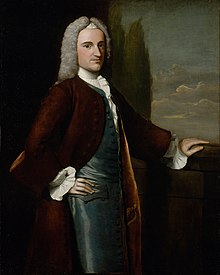Thomas Hopkinson
Thomas Hopkinson (April 6, 1709 – November 5, 1751) was a lawyer, public official, and prominent figure in colonial Philadelphia, Pennsylvania.
Thomas Hopkinson | |
|---|---|
 | |
| Born | April 6, 1709 London, England |
| Died | November 5, 1751 Philadelphia, Colony of Pennsylvania, British America |
| Children | Francis Hopkinson |
| Parent(s) | Thomas Hopkinson |
| Founding Member, American Philosophical Society, First President of the American Philosophical Society (1743-1744) | |
| In office 1743–1751 | |
Early life
Thomas Hopkinson was born in London, on April 6, 1709, the son of Mary Hopkinson, and Thomas Hopkinson, a London scrivener and a member of Middle Temple. He was educated there, attending Oxford University (but not graduating) and then studying law at London. He then immigrated about 1731 to Pennsylvania, where he became a merchant, lawyer, judge, and natural philosopher, as well as a friend of Benjamin Franklin.[1]
Career
He worked with Franklin on several of his experiments on electricity and was a member of the Junto. As a young barrister, he was appointed deputy to Charles Read, Clerk of the Orphans' Court of Philadelphia. Upon his death, he was commissioned as his successor on January 20, 1736–7, filling that position until November 5, 1751, when he died. On the same date, he was commissioned Master of Rolls for the city, serving until 1741.[1]
Hopkinson held a number of legal and judicial positions, including Justice (1749), and Judge of the Vice Admiralty of the Province (1744-5). He was also a member of the Provincial (1747), and Common Councils (1741). As a merchant, Hopkinson acted as agent for several London firms, and in partnership with William Coleman, imported and sold a wide variety of goods, including fabrics, spices, gunpowder and iron. Under James Hamilton, he became Deputy Prothonotary, in 1748 becoming Prothonotary until his death.[1]
Hopkinson was a founder of both the Library Company of Philadelphia, as well as an original trustee of the College of Philadelphia (now the University of Pennsylvania), and served as first president of the American Philosophical Society. He was also an active Mason. He married Mary Johnson in 1736, and together they had eight children. He enrolled his son Francis Hopkinson, later a signatory of the Declaration of Independence in the first classes at the Academy. One of his daughters married Reverend Jacob Duché, and another Dr. John Morgan. Hopkinson was an early subscriber of the Dancing Assembly.[1]
Franklin wrote about him: "The power of points to throw off electrical fire was first communicated to me by my ingenious friend, Thomas Hopkinson, since deceased, whose virtue and integrity in every station of life, public and private, will ever make his memory dear to those who knew him and knew how to value him".[1]
Family
Thomas Hopkinson married at Christ Church, Philadelphia on September 9, 1735, to Mary Johnson (b. August 4, 1718, Appoquinimink Hundred - d. November 9, 1804, Philadelphia). Johnson's grandfather was Sergeant-at-arms to Charles II, while her first cousin was James Johnson (bishop of Worcester).[1]
Hopkinson died in Philadelphia, 5 November 1751.[1]
References
- John W. Jordan; LL. D. 1911. Colonial families of Philadelphia. Рипол Классик. p. 1189. ISBN 978-5-88023-355-7.
External links
- Biography and portrait at the University of Pennsylvania
- Portrait of Thomas Hopkinson by Robert Feke at the Smithsonian Institution
- The Hopkinson Family Papers, including correspondence, documents and printed materials, are available for research use at the Historical Society of Pennsylvania.